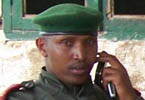
Reports on the wires this morning that Congolese general and wanted warlord Bosco Ntaganda is playing a key role in the ongoing offensive by the Congolese army, or FARDC, against the Rwandan Hutu rebel militia known as the FDLR, in eastern Congo. It is more disappointing than surprising that the Congolese army would grant Ntaganda a lead role in this mission; he was involved in the joint Congo-Rwanda offensive against the FDLR earlier this year, and the Congolese army is not known for their sterling human rights record or penchant for promoting the norms of international justice and accountability.
However, the wire stories this morning are causing considerable waves because it appears the United Nations peacekeeping mission in Congo, or MONUC, has willingly looked past the official involvement of Bosco in the Congolese army operations with which the UN is collaborating. A MONUC spokesman said yesterday that “Bosco Ntaganda’s name does not appear" on official documents detailing the chain of command, and "we have from our Congolese counterparts an assurance that he is not part of the command." Human Rights Watch accused MONUC of “burying its head in the sand” on the issue of Bosco and ignoring plentiful evidence that Bosco is indeed playing of his significant role in the Congolese army’s chain of command in their ongoing offensive.
Human Rights Watch continues to call for the U.N. to “address the issue head on” and put pressure on the Rwandan and Congolese governments to arrest Bosco and send him to stand trial at the International Criminal Court in The Hague. We here at Enough agree. Indeed, the problem of rampant impunity throughout Congo is a crucial piece of the puzzle in Congo. None of Congo’s problems—from the illicit minerals trade to the scourge of widespread sexual violence—can be solved without a local, national, and international effort to address the root causes of impunity and promote a culture of accountability. Warlords like Bosco Ntaganda belong in prison, not in key posts in the Congolese army.
We understand that MONUC feels caught between a rock and hard place on this issues. On one hand, the U.N. mission has been heavily criticized for months because of its its failure to protect civilians from the predations of the FDLR and other armed groups. One key element of protecting civilians in eastern Congo is clearly going after the FDLR which often entails MONUC collaborating more closely with the Congolese army. Yet, on the other hand, the Congolese army has decided to give a prominent war criminal a key role in carrying out its offensive with only the thinnest veneer of plausible deniability. Maybe if MONUC had been given the sufficient troops on the ground, it wouldn’t need to make the kind of devil’s bargain that it appears willing to embrace as it puts it’s head in the sand and pretends that Bosco is not still a key military player. Embracing a war criminal, even if it makes for short term gains, is not a bargain worth making.

